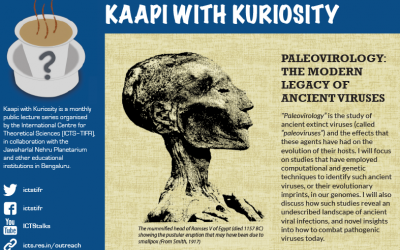"Paleovirology” is the study of ancient extinct viruses (called “paleoviruses”) and the effects that these agents have had on the evolution of their hosts. I will focus on studies that have employed computational and genetic techniques to identify such ancient viruses, or their evolutionary imprints, in our genomes. I will also discuss how such studies reveal an undescribed landscape of ancient viral infections, and novel insights into how to combat pathogenic viruses today.
About the speaker
Harmit Malik got his BTech, Chemical Engineering, Indian Institute of Technology, Mumbai, India where he became interested in molecular biology due to Prof. K.K. Rao and in evolution by reading Richard Dawkins’ “The Selfish Gene”. He then moved to the US to get his PhD in Biology, at the University of Rochester, NY, under the mentorship of Prof. Thomas Eickbush. In 1999, he moved to Seattle to the Fred Hutchinson Cancer Research Center (the “Hutch"), to do his postdoc with Dr. Steve Henikoff. IN 2003, he started his own lab at the Hutch, where he has been ever since. In 2009, he was awarded an Early Career Scientist of the Howard Hughes Medical Institute and a Full Investigator in 2013.
Harmit Malik studies the causes and consequences of genetic conflicts that take place between different genomes (e.g., host-virus interactions, mitochondrial conflicts with nuclear genomes) or between components of the same genome (e.g., chromosomal competition at centromeric regions). He is interested in understanding these "molecular arms races" and how they drive recurrent genetic innovation, from the perspective of both evolutionary biology and human disease. Malik and his colleagues have used an evolutionary lens to dissect and discover both primate antiviral as well as viral adaptation strategies. By taking advantage of viral ‘fossils’ in animal genomes and intense episodes of ancient host gene adaptation, his work has helped found the field of Paleovirology. His lab has been able to describe functional outcomes of ancient host-virus arms races by resurrecting both host and viral proteins from the evolutionary record. A significant area of research in the Malik lab is the study of rapid evolution in genes involved in essential cellular processes such as chromosome segregation and mitochondrial biology. He has proposed that unusual genetic conflicts during meiosis drive the unexpectedly rapid evolution of centromeric DNA and proteins, which in turn may provide a basis of postzygotic reproductive isolation between recently diverged species.
Register here for the event
Contact Us: outreach @ icts . res . in


